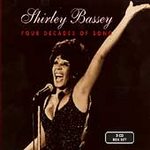
Dame Shirley Veronica Bassey is a Welsh singer. Known for her career longevity, powerful voice and recording the theme songs to three James Bond films, Bassey is one of the most popular vocalists in Britain.

"Something" is a song by the English rock band the Beatles from their eleventh studio album Abbey Road (1969). It was written by George Harrison, the band's lead guitarist. Together with his second contribution to Abbey Road, "Here Comes the Sun", it is widely viewed by music historians as having marked Harrison's ascendancy as a composer to the level of the Beatles' principal songwriters, John Lennon and Paul McCartney. Two weeks after the album's release, the song was issued on a double A-side single, coupled with "Come Together", making it the first Harrison composition to become a Beatles A-side. The pairing was also the first time in the United Kingdom that the Beatles issued a single containing tracks already available on an album. While the single's commercial performance was lessened by this, it topped the Billboard Hot 100 in the United States as well as charts in Australia, Canada, New Zealand and West Germany, and peaked at number 4 in the UK.
Arthur Greenslade was a British conductor and arranger for films and television, as well as for a number of performers. He was most musically active in the 1960s and 1970s.

Something is a 1970 album by Shirley Bassey. With her career having been in decline since the latter part of the mid 1960s, Something proved to be Shirley Bassey's comeback when it was released in August 1970. The title track single became her biggest UK hit for many years, reaching No.4 and spending 22 weeks on the chart. This was actually the second single featured on the album, "The Sea and Sand" having already been released earlier. The album was similarly her biggest hit for many years in the album charts, reaching No.5 and spending 28 weeks in the top 50.

"The Other Side of Me" is a pop song written by Neil Sedaka and Howard Greenfield. Sedaka's version of the song was released on his 1973 UK album The Tra-La Days Are Over. Donny Osmond also released an album version of the song in 1973, on Alone Together, and it was the title track of Vince Hill's 1973 LP.

Something Else is a 1971 album by Shirley Bassey.

I Capricorn is a 1972 album by Shirley Bassey.

Never Never Never is a 1973 album by Shirley Bassey. It features the hit single title track, which was a UK top 10 hit, which became one of Bassey's best-known songs. The album also became a top 10 hit in the UK and was a moderate hit in the US.
"What I Did for Love" is a song from the musical A Chorus Line with music by Marvin Hamlisch and lyrics by Edward Kleban. It was quickly recognized for its show-business potential outside Broadway and was picked up by popular singers to include in their performances in their club and television appearances. Both female and male singers have made it an inclusion in their recorded albums to great effect. The Daily Telegraph described it as a "big anthem".

Let's Face the Music is the sixth Shirley Bassey studio album, released in 1962 and arranged by Nelson Riddle. Kenneth Hume, Shirley Bassey's husband and manager, wrote the sleeve notes for this album, in which he gives an insight into how this album came to be: "When Vic Lewis booked Nelson Riddle for a tour with Shirley, we were all very excited; being great fans of Nelson Riddle's from way back...so when someone suggested them doing an LP together, we thought that this would not be possible, remembering that Nelson was under contract with another recording company." Nelson Riddle was under contract to Capitol Records at the time, so Bassey's producer Norman Newell went about to secure his services for an album. While on the tour, Bassey, Riddle, and Bassey's music director Raymond Long, discussed what form the album should take. Shortly after the tour was completed, the recording sessions began.

Thank You for the Years is a 2003 album by Dame Shirley Bassey.

Bassey – The EMI/UA Years 1959–1979 is a 5-CD boxset compilation from Shirley Bassey issued in 1994, this set features 94 studio recordings on four CDs, recorded for EMI/United Artists between 1959 and 1979. Disc five features a previously unreleased live recording from Carnegie Hall. The boxset was reissued by EMI in 2010 in a standard jewel case set.

Thoughts of Love is a compilation album released in 1976 by singer Shirley Bassey. A themed compilation of love songs, selected from material recorded in the late 1960s and early 1970s, the album sold well in the UK and Germany, reaching the Top 20 in the UK Albums Chart and achieved Gold status. Thoughts of Love was re-issued on CD in 2011 by BGO Records, together with the 1979 album The Magic Is You.

Keep the Music Playing is a 1991 album by Shirley Bassey. The album was recorded in the UK at the Westgreen Studios and in the Netherlands at Wisseloord Studios, Hilversum. The album is a mixture of contemporary pop ballads, such as "I Want to Know What Love Is" from Foreigner, the Jennifer Rush power ballad "The Power of Love", and the more gentle "Still" from Lionel Richie, combined with standards from the field of jazz and pop, such as "He Was Beautiful", the sweet jazz ballad from Cleo Laine. Several of the song arrangements reflect an operatic pop style influence, which may have roots in her 1984 album I Am What I Am, which she recorded with the London Symphony Orchestra, and the fact that in the latter mid-1980s she started working with a vocal coach, a former opera singer. Bassey returned to the Beatles with "Yesterday", as she had previously covered "Something" and "Fool on the Hill" successfully in the 1970s, and had performed "Hey Jude" frequently live. Another previously successful formula was used for the closing track "Dio, Come Ti Amo " an Italian original in the tradition of "This is My Life" and "Natalie"..
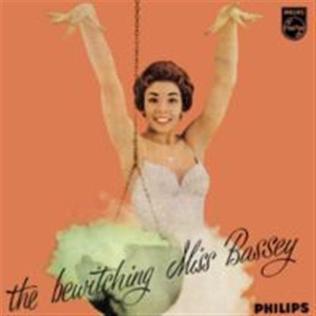
The Bewitching Miss Bassey is the second studio album by Welsh singer Shirley Bassey. Consisting of new and previously released material, this was the first album by Bassey to be issued on the 12" Long-playing record format. Tracks were taken from sessions recorded between 1956 and early 1959. All the songs were recorded in the UK with Wally Stott and his Orchestra, with production by Johnny Franz. The only exception was "The Wall" which was recorded in New York with Jimmy Carroll and his orchestra and produced by Mitch Miller. Featuring Bassey's first five hit songs, including Bassey's 1958 number one single "As I Love You" and the huge hit "Kiss Me, Honey Honey, Kiss Me". The album showcases the best of the early career of Shirley Bassey. All the songs were only recorded in mono, no stereo versions are known to exist. In the 1970s Philips did re-issue them in an "electronically enhanced" stereo. The album was re-issued in the US on the Epic label with different artwork. While this album has not been issued independently on CD, it was included in its entirety on the four-CD compilation titled Five Classic Albums Plus Bonus Singles in 2012.
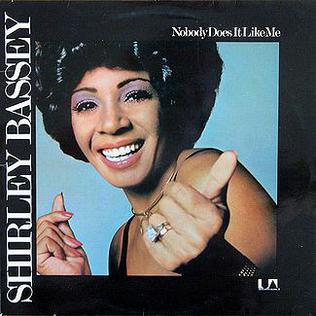
Nobody Does It Like Me is a 1974 album by Shirley Bassey. Bassey's recordings had been selling well since 1970, scoring three top ten singles and three ten top albums. Nobody Does It Like Me was recorded with a new producer, George Butler, and brought a partial return to the traditional pop sound of Bassey's pre-1970s career. Here, the title track "Nobody Does It Like Me" and "When You Smile" harken back to the big band era. Bassey's soaring vocals on Paul Anka's "I'm Not Anyone" and the slightly funky "Morning in Your Eyes" contrast with a delicately rendered "Davy". The duet "Davy", recorded with the song's composer Benard Ighner, is one of the rare occasions that Bassey would share the credits with another vocalist; it was also issued as a single and hit #44 on the US Adult Contemporary chart. The album closes with Bassey's reading of Stevie Wonder's "You Are the Sunshine of My Life". This album failed to chart in the UK, and peaked at #142 in the US. Her next two studio albums would be top 15 albums in the UK.

Good, Bad but Beautiful is a 1975 album by Shirley Bassey. In the first half of the decade, Bassey recorded nine albums, with three making the top ten. In March 1975, Bassey released a compilation that became her highest-charting album to date, The Shirley Bassey Singles Album (#2), and reflects the momentum Bassey had maintained since her 1970 "comeback". Good, Bad but Beautiful, released in the autumn of 1975, spent seven weeks on the UK Albums Chart, peaking at #13, and earned a silver disc. The album reflects the formula that brought Bassey back to the charts: a combination of contemporary songs combined with her forte of standards, show tunes, and torch songs, featuring arrangements aimed squarely at the adult contemporary, or middle-of-the-road, audience. This was also achieved by modifying her backup orchestra to include electric guitars, a string and brass section with a more contemporary sound, and drumming that is more soft rock-oriented than jazz-oriented, while side two's opener, "Feel Like Makin' Love" displays a smooth jazz style.
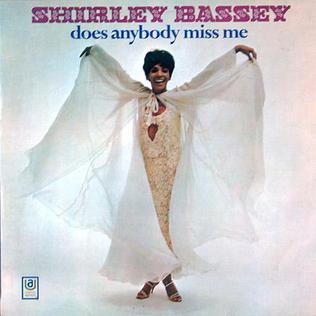
Does Anybody Miss Me is a 1969 album by Shirley Bassey. In 1969 Bassey moved her home to Lugano, Switzerland, with her second husband Sergio Novak, whom she had married in Las Vegas in August 1968. Remaining as a tax exile prevented her from performing and recording in the UK. In this period she continued to perform and record in Italy and the US. This album was recorded in the US and produced by the American producer Dave Pell, with arrangements by Artie Butler. The tracks on this album are a selection of standards and show tunes. The title track Does Anybody Miss Me was issued as a single in the UK, backed with the non album track Fa Fa Fa, but this failed to make any impression on the chart. Does Anybody Miss Me has remained part of her live show and was recorded as the opening track of the album Live At Talk Of The Town in 1970. This album saw Bassey re-record her 1958 UK #1 hit single As I Love You which she had previously released on the Philips label.
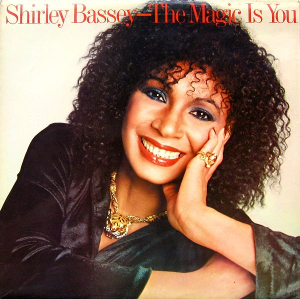
The Magic Is You is a 1979 album by Welsh singer Shirley Bassey. Her final album for United Artists Records, the album notably featured a disco version of her signature 1968 song "This Is My Life".

25th Anniversary Album is a compilation album by Shirley Bassey. Released in 1978 to mark her 25th year in show business, the album was a double set, comprising 40 tracks. The songs included span just 20 of the 25 years from 1957 to 1976, however, her first professional contract is dated 1953. Bassey had toured extensively throughout 1978 to mark her 25 years. This collection, including her biggest hits and some lesser-known recordings, became one of her biggest in the UK, where it reached No.3 and spent 12 weeks on the album chart.
